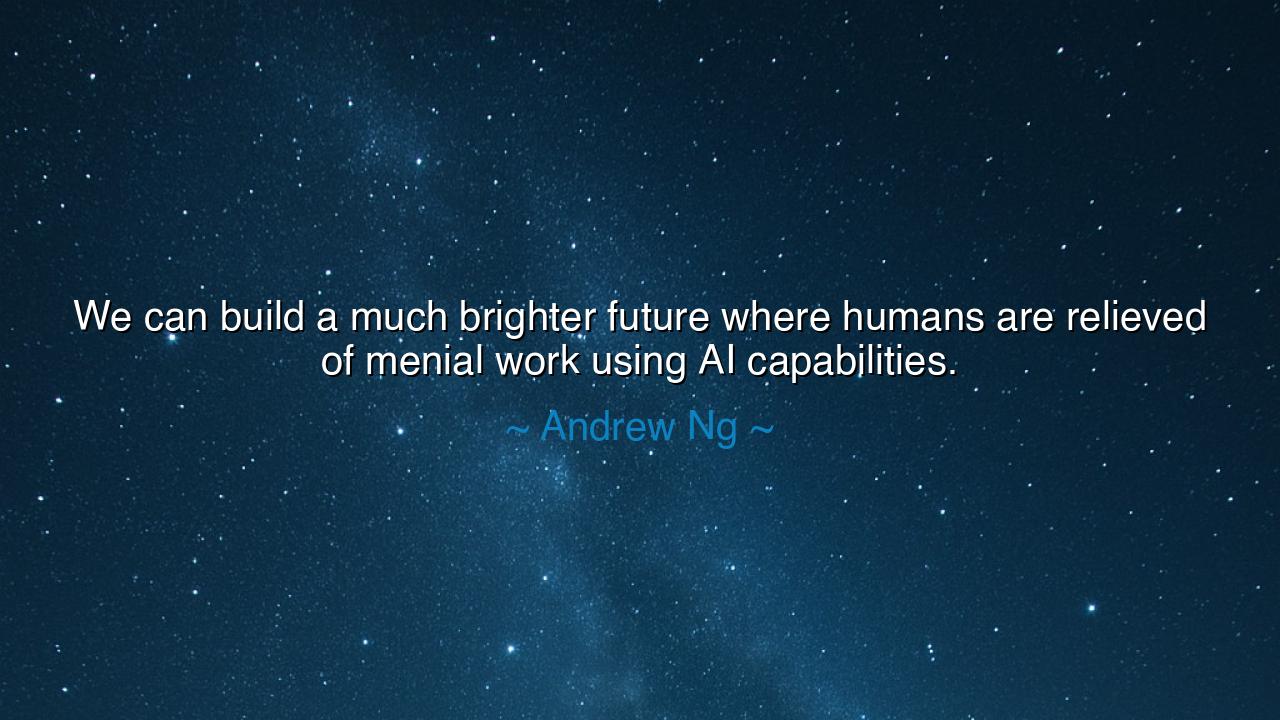
We can build a much brighter future where humans are relieved of
We can build a much brighter future where humans are relieved of menial work using AI capabilities.






"We can build a much brighter future where humans are relieved of menial work using AI capabilities." With these words, Andrew Ng envisions a world where the burdens of repetitive and labor-intensive tasks are lifted from human shoulders, allowing for a future where technology works not against humanity, but in concert with it. AI, or artificial intelligence, is seen by Ng as a transformative force capable of unlocking the potential of human creativity and ingenuity by freeing people from mundane and tedious labor. This vision promises a future where people can focus on meaningful work, pursue their passions, and contribute to the advancement of society, rather than being shackled to work that stifles their creative spirit.
In the ancient world, there was a deep awareness of the division between the intellectual and manual labor. Plato in his Republic spoke of the philosopher-king—an ideal ruler who would govern not through force, but through wisdom and reason. He believed that a well-ordered society was one where individuals could rise above the labor of menial tasks and dedicate themselves to higher purposes. The ancient Greeks revered thinkers like Aristotle, who believed in the intellectual virtues of contemplation and creativity. But even in his time, intellectual work was often dependent on the labor of others—slaves and servants who did the physical work so that others could ponder and explore ideas. This separation between labor and thought was accepted, but also recognized as a source of inequality.
Ng’s quote builds on this ancient understanding, suggesting that AI has the potential to relieve humanity of the drudgery of menial tasks—tasks that have historically been performed by the lowest classes, or even through forced labor, in order to allow the elite to pursue intellectual and creative endeavors. In a sense, AI offers an opportunity to democratize access to freedom—freedom from the repetition of work that does not nurture the human soul, and instead opens up space for the development of new ideas, art, and technological advancement. This is the same promise that the great thinkers of ancient civilizations longed for: a world where people could thrive, not just survive, where they could express their full potential.
Consider the story of Leonardo da Vinci, whose genius was allowed to flourish not because of the conditions he was born into, but because he lived in a time when the patrons of the Renaissance supported the intellectual and artistic endeavors of individuals like him. Da Vinci’s work as an artist, scientist, and inventor was groundbreaking because he was freed from the burdens of manual labor that would have consumed his time and energies. Had he been born into a time without such patronage or technological advancement, his potential might never have been realized. This illustrates the power of supporting human potential by removing the barriers of labor that stifle creativity and innovation. AI has the same potential—just as patrons once supported intellectual and artistic pursuits, so too can artificial intelligence support human creativity by relieving people of repetitive tasks.
The lesson we can draw from Ng's words and the lessons of the past is profound: the future will be defined not by how much we can toil and labor, but by what we can create and imagine. As AI evolves, it promises to give humanity the freedom to focus on higher purposes: scientific breakthroughs, artistic expression, social change, and the betterment of society. AI becomes not a threat, but an ally—an extension of human ingenuity that allows us to reach new heights. In the ancient world, those who were freed from the burden of labor had the time and space to pursue higher knowledge, and today, we stand at the cusp of an era where technology can give us that same opportunity on a global scale.
However, just as Plato warned of the dangers of unequal societies, where the freedom of some was built on the oppression of others, we must approach the rise of AI with wisdom. It is crucial that we ensure that this new era of freedom is accessible to all. Just as the benefits of the Renaissance were not shared equally among all people, we must be vigilant in ensuring that the advances in AI do not deepen inequality, but instead create a world where every individual has the opportunity to realize their full potential. AI must not replace human labor to increase wealth for the few, but rather enhance human creativity and opportunity for the many.
In practical terms, we must embrace AI, not with fear or suspicion, but with intentionality. We must ensure that the technological advances we make are used to improve society and enrich the lives of all people. This is the task for future generations—to shape the world in such a way that AI becomes a tool for personal and collective growth. As we embrace this new age, let us remember that the true worth of any technology lies in how it is used to elevate humanity, to provide freedom from the constraints of menial work, and to open the doors to a future of creativity, innovation, and collective progress.






AAdministratorAdministrator
Welcome, honored guests. Please leave a comment, we will respond soon